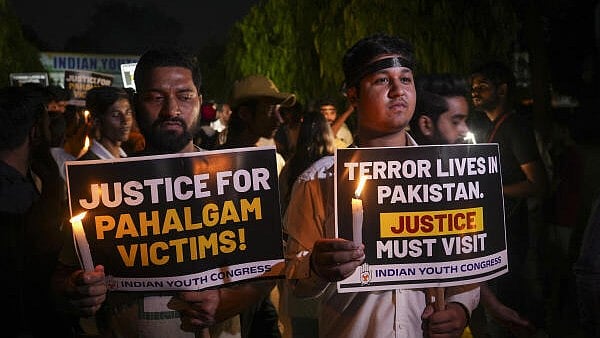
People hold candlelight vigil to pay tribute to the victims of Pahalgam terror attack.
Credit: PTI Photo
New Delhi: A day after 26 people were killed in a terrorist attack in Jammu and Kashmir, India on Wednesday put in abeyance its 65-year-old Indus Water Treaty (IWT) with Pakistan, shut down the Integrated Check Post at Attari-Wagah border between the two countries and further curtailed its already downgraded diplomatic ties with Islamabad.
New Delhi cancelled travel documents issued to the citizens of Pakistan under the SAARC Visa Exemption Scheme (SVES) and asked anyone from the neighbouring country currently in India to leave within 48 hours.
India also expelled three military officials of Pakistan posted as diplomats in New Delhi and also withdrew three of its own in Islamabad. It asked citizens of Pakistan and India who had crossed over to each other’s country through the Attari-Wagah Check Post to return to their country by May 1. The move is likely to make it almost impossible for any citizen of Pakistan to visit India.
India’s diplomatic responses to the latest attacks by terrorists linked to Lashkar-e-Tayyiba in Pakistan were announced after Prime Minister Narendra Modi chaired the meeting of the Cabinet Committee on Security.
Home Minister Amit Shah, Defence Minister Rajnath Singh and External Affairs Minister S Jaishankar were present in the meeting, along with National Security Advisor Ajit Doval and Foreign Secretary Vikram Misri, as well as other senior officials.
“In the briefing to the CCS, the cross-border linkages of the terrorist attack were brought out,” the foreign secretary later told journalists. “It was noted that this attack came in the wake of the successful holding of elections in the Union Territory (J&K) and its steady progress towards economic growth and development.”
“The Indus Waters Treaty of 1960 will be held in abeyance with immediate effect, until Pakistan credibly and irrevocably abjures its support for cross-border terrorism,” said Misri. The IWT had been signed by then Prime Minister Jawaharlal Nehru and his then counterpart, President Ayub Khan, on September 19, 1960. The treaty granted control over the three “eastern rivers” of the Indus River System – Beas, Ravi, and Sutlej – to India, while control over the three “western rivers” – Indus, Chenab, and Jhelum – had been given to Pakistan. It survived several flashpoints in the perpetual conflict between the two nations, including the wars of 1965 and 1971, as well as the Kargil conflict of 1999.
New Delhi had sent two notices to Islamabad seeking review and modification of the IWT – first in January 2023, and then again in August 2024. Misri on Wednesday said in New Delhi that the number of personnel of the high commissions of India and Pakistan in each other’s capitals would now be brought down further from the existing 55 to only 30.
New Delhi expelled Pakistan’s three diplomats – Defence and Army Advisor Brig. Mudassir Saeed, Air Advisor Group Captain Tahir Mahmood Anjum and Naval Advisor Captain Rameez Niaz – from India and asked them to leave within a week. India also decided to withdraw its Defence and Military Advisor, Brigadier M Ravi Shankar, and Naval Advisor Captain Rajeev Kumar Singh.
The post of the Air Advisor at the High Commission of India in Islamabad was already vacant. “These posts in the respective high commissions are deemed annulled,” said the foreign secretary, adding that five support staff of the service advisors would also be withdrawn from each of the high commissions.
The Cabinet Committee on Security, chaired by the prime minister, “condemned” the attack in “the strongest terms, and expressed its deepest condolences to the families of the victims and hoped for the early recovery of the injured”.
“Strong expressions of support and solidarity have been received from many Governments around the world, which have unequivocally condemned this terror attack. The CCS recorded its appreciation for such sentiments, which reflect zero tolerance for terrorism,” the foreign secretary told journalists.
